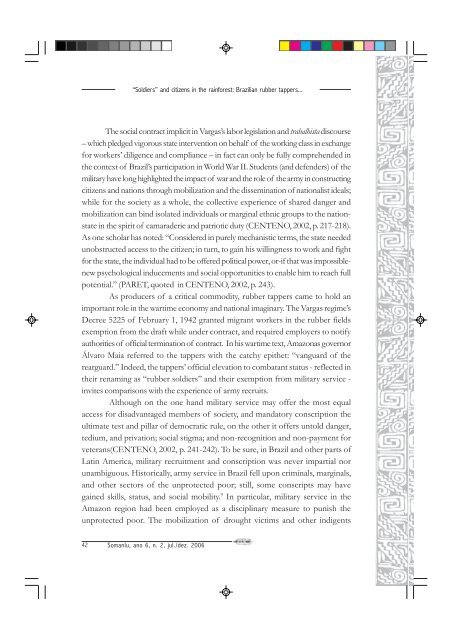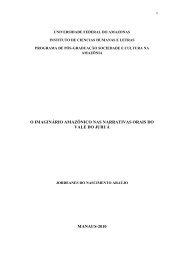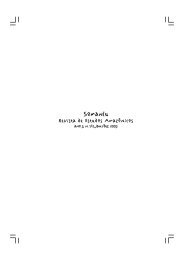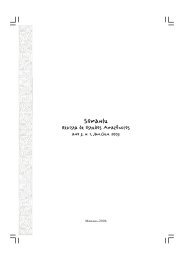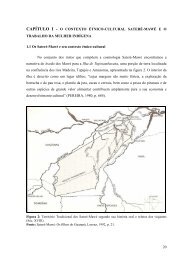somanlu jul dez 2006.pmd - Eventos - Ufam
somanlu jul dez 2006.pmd - Eventos - Ufam
somanlu jul dez 2006.pmd - Eventos - Ufam
You also want an ePaper? Increase the reach of your titles
YUMPU automatically turns print PDFs into web optimized ePapers that Google loves.
“Soldiers” and citizens in the rainforest: Brazilian rubber tappers...<br />
The social contract implicit in Vargas’s labor legislation and trabalhista discourse<br />
– which pledged vigorous state intervention on behalf of the working class in exchange<br />
for workers’ diligence and compliance – in fact can only be fully comprehended in<br />
the context of Brazil’s participation in World War II. Students (and defenders) of the<br />
military have long highlighted the impact of war and the role of the army in constructing<br />
citizens and nations through mobilization and the dissemination of nationalist ideals;<br />
while for the society as a whole, the collective experience of shared danger and<br />
mobilization can bind isolated individuals or marginal ethnic groups to the nationstate<br />
in the spirit of camaraderie and patriotic duty (CENTENO, 2002, p. 217-218).<br />
As one scholar has noted: “Considered in purely mechanistic terms, the state needed<br />
unobstructed access to the citizen; in turn, to gain his willingness to work and fight<br />
for the state, the individual had to be offered political power, or-if that was impossiblenew<br />
psychological inducements and social opportunities to enable him to reach full<br />
potential.” (PARET, quoted in CENTENO, 2002, p. 243).<br />
As producers of a critical commodity, rubber tappers came to hold an<br />
important role in the wartime economy and national imaginary. The Vargas regime’s<br />
Decree 5225 of February 1, 1942 granted migrant workers in the rubber fields<br />
exemption from the draft while under contract, and required employers to notify<br />
authorities of official termination of contract. In his wartime text, Amazonas governor<br />
Álvaro Maia referred to the tappers with the catchy epithet: “vanguard of the<br />
rearguard.” Indeed, the tappers’ official elevation to combatant status - reflected in<br />
their renaming as “rubber soldiers” and their exemption from military service -<br />
invites comparisons with the experience of army recruits.<br />
Although on the one hand military service may offer the most equal<br />
access for disadvantaged members of society, and mandatory conscription the<br />
ultimate test and pillar of democratic rule, on the other it offers untold danger,<br />
tedium, and privation; social stigma; and non-recognition and non-payment for<br />
veterans(CENTENO, 2002, p. 241-242). To be sure, in Brazil and other parts of<br />
Latin America, military recruitment and conscription was never impartial nor<br />
unambiguous. Historically, army service in Brazil fell upon criminals, marginals,<br />
and other sectors of the unprotected poor; still, some conscripts may have<br />
gained skills, status, and social mobility. 9 In particular, military service in the<br />
Amazon region had been employed as a disciplinary measure to punish the<br />
unprotected poor. The mobilization of drought victims and other indigents<br />
42 Somanlu, ano 6, n. 2, <strong>jul</strong>./<strong>dez</strong>. 2006


